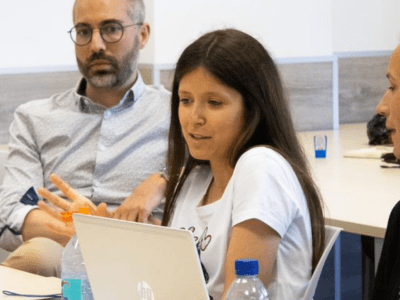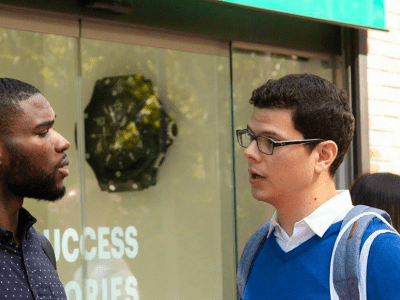The education level of an institution depends not only on the content being taught but also on how it is taught. EU Online campus human resources management lecturer, Konstantinos Biginas, is a firm believer in meaningful interaction between students and teachers.
If delivered well, online education is for everyone. It provides a richer and more interactive classroom, allows students to develop a set of sophisticated virtual communication skills and utilizes the power of multimedia to help everyone remember what they learn!
 Biginas studied economics at Staffordshire University and a few years later completed a master’s in international marketing management at the University of East London. Then he started a PhD in Management & Organizational Change. His knowledge and experience in the areas of international business and management have made him a popular and respected lecturer at EU
Biginas studied economics at Staffordshire University and a few years later completed a master’s in international marketing management at the University of East London. Then he started a PhD in Management & Organizational Change. His knowledge and experience in the areas of international business and management have made him a popular and respected lecturer at EU
Biginas is actively involved in research and academic writing. As a member of an international research team, he participates in various research projects related to international management and innovation with the aim to develop and publish research papers through participation in conferences and workshops in Europe. He is also involved in book writing and is the associate editor for a book series. His wealth of experience allows him to:
teach students through real-world examples;
“The socioeconomic and political environment of an enterprise has a direct bearing on the context or the climate under which the human resource management of an organization functions. The key drivers of an organization’s external environment include the extent of external regulations, nature of work contracts, various labor legislations, and case laws, to name a few. Such factors remain ever changing, and as such, the political, socioeconomic and cultural atmosphere of human resource management remains in a constant state of flux.”
“This is why I always make sure to update the HRM curriculum with current debates and controversies relating to globalization; business ethics and sustainability; the changing ecology of team networking on social media and other important, contemporary issues. In each of my classes, I emphasize critical thinking and real-world applications of the concepts and issues we study, by integrating materials, examples, articles, and news updates which I draw from my writing and research.”
Another stand-out feature of online education is the high-quality resources it provides to students. At EU, our programs are equal to their on-campus counterparts, more than 100 online students enjoy the same high-caliber faculty made up of academics and business leaders.
For Biginas, online education is as valid as traditional classroom education and comes with three unique advantages:
“Enhanced class discussions: The discussion forum of an online course offers a unique opportunity to gain an in-depth understanding of classmates’ views. Discussion forums also bring an intense focus on course content, as students come together to analyze the readings and expand on each other’s thought processes.
Chance for interaction: Online courses may be less intimidating than the brick-and-mortar classroom setting, and could help to increase student interaction. By allowing everyone to have a voice, shared ideas diversify. Students can also think longer about what they want to say and add their comments when they are ready. In a traditional classroom, conversations can quickly move past the point where the student may be willing to comment.
Comfort and ease of accessibility: Students can access and log on to their course at any time. This means that parents, working students, and professionals on the move have the option of attending classes no matter what their work schedule. Students only need a computer and internet access to take online classes. Courseware is accessible to students when they need it. Students can review lectures, discussions, explanations, and comments. Individuals can also share notes with each other to help facilitate community learning.”
As an expert on human resources, Biginas knows a lot about the
features needed to develop a successful online environment;
“I believe that a qualified online instructor is one who, above all, can provide meaningful learning experiences for learners. An understanding of the intersection of technology, pedagogy, and content is essential for the provision of active facilitation and technology-mediated support to students. This entails making the online environment feel like a conversation and foster a sense of belonging, providing “verbal immediacy” and “just-in-time” assistance. I always feel it is of utmost importance to establish a welcoming presence; set a tone that encourages reflection and inquiry; broaden and deepen online communication; assess both individual and group learning and interactions; make critical judgments about whether, and how well, participants are gaining content-specific knowledge; encourage those who fall behind in posting and in general encourage participative learning.”
In addition to being an online lecturer, Biginas was once an online student himself and adds to why he is such a great supporter of online education. Biginas aims to inspire students to take the leap and take advantage of the amazing educational system that is online education.
“Persistence is perhaps the biggest key to success in online learning. Usually, those who succeed are those who are willing to tolerate technical problems, seek help when needed, work daily on every class, and persist when faced with challenges”
“My advice to students who embark on the journey of online education would be to never give up and keep trying even when they run into a challenge! Also, a good idea is to set up a manageable study schedule for yourself and stick to it. The students that succeed are the ones that log on and make progress every day. This is especially important after the novelty of going to an online business school starts to wear off!”









